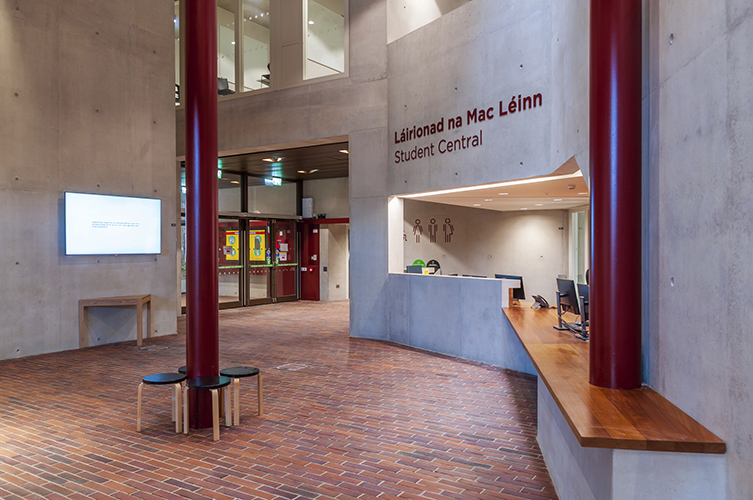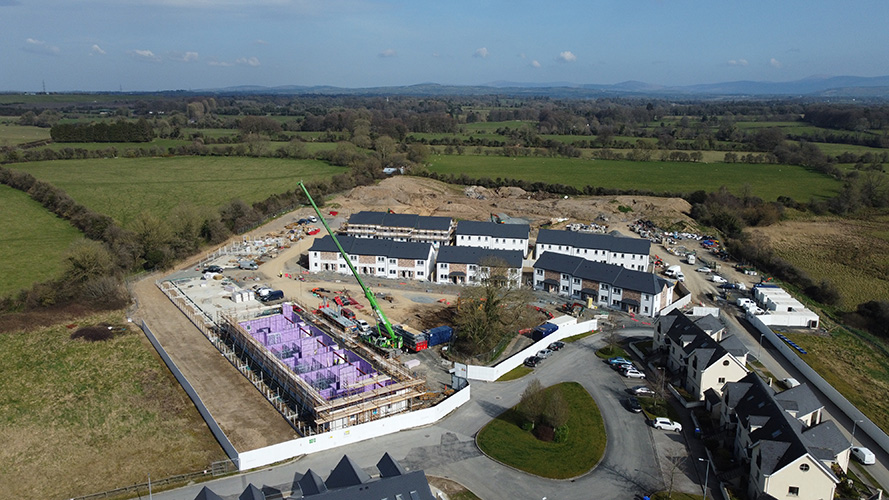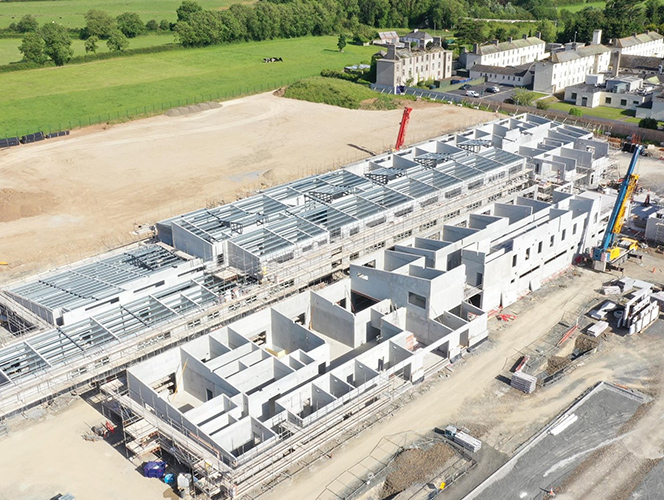Irish Concrete Federation highlights the essential role of aggregates in meeting Ireland’s housing and infrastructural needs

Gerry Farrell, CEO, Irish Concrete Federation, discusses the essential role of aggregates and concrete products in house building and how progress is being made to ensure the sector plays its part in assisting the construction industry move towards a more sustainable future.
Aggregates are an integral part of Ireland’s built environment. Crushed rock, sand and gravel, ready-mix concrete, concrete blocks, precast concrete, paving, mortars and plasters are all aggregate-based products and are found in every construction project in the country.
Gerry Farrell, who heads up the Irish Concrete Federation (ICF), says his members are an essential part of the construction supply chain. For him, the big concern regarding the objectives of Housing for All (HfA) and the National Development Plan NDP) is the need to ensure that future supplies of aggregates are planned, monitored and managed in a sustainable manner to meet society’s needs. In addition, he is determined that the ICF and its members work towards a concrete and aggregates sector that is environmentally responsible, resource-efficient, and makes a positive contribution to the people, places, and economy of Ireland as we move towards a net zero-carbon future.
Irish Concrete Federation
The ICF is the national representative organisation for the Irish aggregates and concrete products industry. It has 74 members and associate members operating at approximately 300 locations throughout the country.
Its membership includes publicly-listed and family-owned businesses that are responsible for the manufacture and supply of the key building materials used in the construction of Ireland’s built environment. The majority of members manufacture aggregates (crushed rock, sand and gravel), ready-mix concrete and precast concrete products for supply to Ireland’s construction sector.
Inflation
Input cost inflation is an immediate concern for Farrell and ICF members.
“In 2022, our members have seen unprecedented increases in manufacturing and transport costs. Cement production is highly energy intensive, and, as a result, there have been significant increases in the cost of cement, which is a key raw material for concrete manufacture.”
In addition, fuel price increases have had a major impact on delivery costs.
“Our members are transport and logistics companies as well as manufacturers and have large fleets of trucks on the road every day, and therefore the massive increases in fuel costs this year is a major challenge.”
Farrell continues, “Unfortunately, suppliers have little choice but to try to pass on these increased costs to customers, which ultimately leads to increased building costs. While this is understandably seen as an unwelcome development, the reality is that the concrete and quarried materials used in new house construction represent a small element of overall housebuilding costs.”
ICF research carried out in 2021 shows that the basic construction materials supplied by quarry operators, ready-mix concrete suppliers and other concrete product suppliers accounted for less than 4% of the cost of building a three-bedroomed semi-detached house in the greater Dublin area.
“So, despite the recent increases in materials costs, the basic construction materials supplied by our members still represent great value compared to other construction products,” Gerry Farrell explains.

Sustainability and concrete
The ICF aims to have a fully resourced sustainability function within the federation in the coming months. A series of environmental product declarations (EPDs) are currently in development, which the ICF hopes will inform and assist the construction sector when it comes to concrete design and construction.
“We are also contributing to the development of end-of-waste criteria for concrete that comes from construction and demolition waste by the Environmental Protection Agency to facilitate the greater use of recycled aggregates,” Gerry Farrell explains. “Over the past 20 years, cement companies have made significant progress in reducing the carbon footprint of cement through greater energy efficiency and the use of alternative fuels. New innovative products like CEM II cements and the use of Ground Granulated Blastfurnace Slag (GGBS) are also helping to reduce the carbon footprint of concrete.”
The global cement industry has developed a roadmap to achieve net zero carbon by 2050, which is a challenging target. Gerry Farrell concludes, “The concrete and aggregates sector will contribute positively to Ireland’s climate ambitions, biodiversity and circular economy, while also delivering the development required to enable sustainable communities and economic growth.”

About The Irish Concrete Federation
The Irish Concrete Federation (ICF) is the national representative organisation for the Irish aggregates and concrete products industry. The Federation has 74 members and associate members operating at approximately 300 locations throughout the country. The membership is made up of both publicly listed and family-owned businesses. Our members are responsible for the manufacture and supply of the key building materials used in the construction of Ireland’s built environment. The majority of our members manufacture aggregates (crushed rock, sand and gravel), ready mixed concrete and precast concrete products for supply to the Irish construction industry. In addition, some members manufacture agricultural lime, which is used by farmers to improve soil fertility.
To become a member or learn more about the Irish Concrete Federation, phone 01 464 0082, email info@irishconcrete.ie, or visit www.irishconcrete.ie






